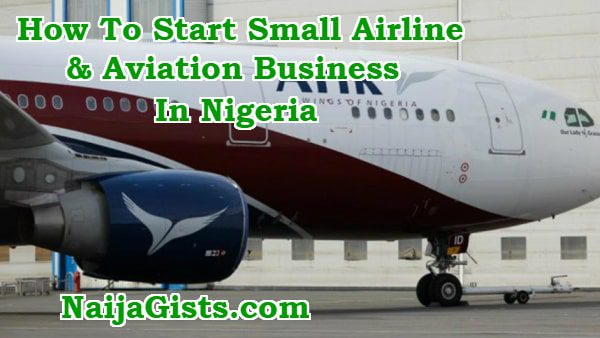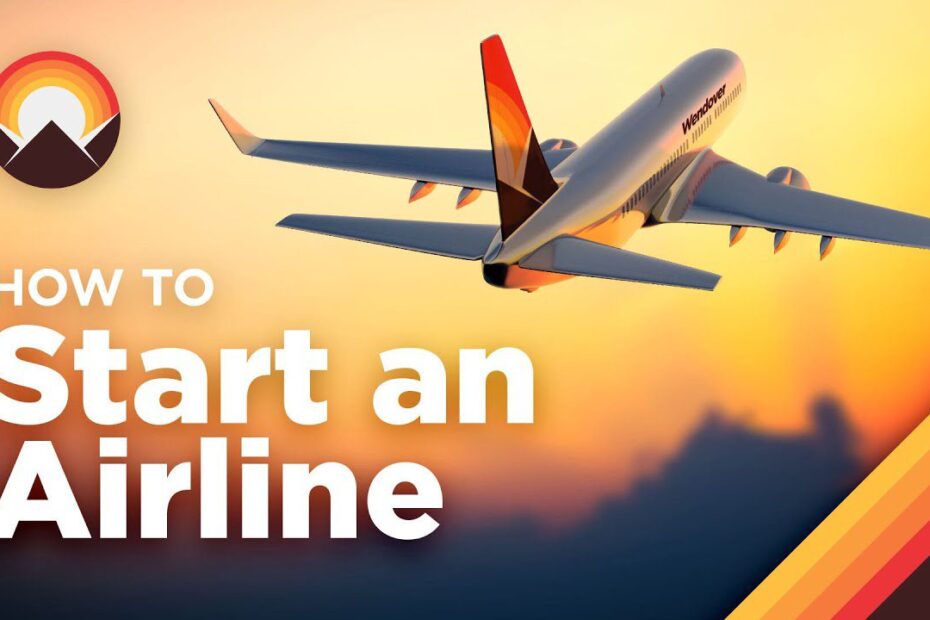There are a few steps to starting an aviation business. First, you will need to obtain the necessary licenses and permits from the Federal Aviation Administration (FAA). Next, you will need to find a suitable location for your business.
Finally, you will need to purchase or lease aircraft and create a business plan.
- Firstly, you will need to gain an understanding of the aviation industry and how it works
- This can be done by reading books, attending seminars or even taking flying lessons
- Once you have a good understanding of the aviation industry, you will need to develop a business plan for your aviation business
- This should include what services you will offer and how you will generate revenue
- Next, you will need to secure funding for your aviation business
- This can be done through investment, loans or grants from government agencies
- Once you have secured funding, you will need to find a suitable location for your business
- This should be close to an airport so that you can easily access aircraft and customers
- 5 Finally, you will need to obtain the necessary licenses and permits required to operate an aviation business in your country/state
Starting an Airline Business Plan Pdf
Have you ever thought about starting your own airline? It may seem like a daunting task, but with careful planning and a solid business plan, it can be a reality. Here are some things to consider when creating a business plan for your new airline:
1. Define your niche. What type of airline do you want to create? There are many options available, from low-cost carriers to luxury airlines.
Decide what kind of experience you want your customers to have, and build your business plan around that.
2. Develop a marketing strategy. How will you reach potential customers and convince them to fly with your airline?
You’ll need to have a strong marketing plan in place in order to succeed.
3. Create a financial forecast. This is arguably the most important part of your business plan – if you don’t have sound financials, your airline is likely doomed from the start.
Make sure to do your research and put together realistic projections for both start-up costs and ongoing expenses.
4 . Plan for growth .
Don’t just focus on getting off the ground – think about how you will expand your operation over time . What new routes or services could you add as you grow ? Having a solid growth strategy in place will make it easier to secure funding and attract investors .
Aviation Business Ideas
The aviation industry is a fascinating and complex world with many different businesses to choose from. Here are just a few ideas to get you started in this exciting industry!
1. Aircraft Maintenance and Repair: There is always a need for qualified aircraft maintenance engineers and technicians to keep planes flying safely.
This can be a great business idea for those with the right skills and training.
2. Flight Training: If you have a passion for flying, why not share it with others by becoming a flight instructor? You can help people achieve their dreams of becoming pilots while also running your own business.
3. Aircraft Sales and Brokerage: Buying and selling aircraft can be a lucrative business, especially if you have access to exclusive listings or good relationships with buyers and sellers.
4. Airport Management: Airports are complex businesses with many moving parts, from air traffic control to ground operations. If you have experience in airport management or another related field, this could be the perfect opportunity for you to start your own business.
How to Start an Airline With No Money
So you want to start an airline, but you don’t have any money. Well, you’re in luck! It is possible to start an airline with no money, though it will require some creative thinking and hard work.
Here are a few tips on how to get started:
1. Find a niche market. There are many small airlines that cater to specific markets, such as regional routes or low-cost travel.
Find a niche that you can fill and that will give your airline a competitive advantage.
2. Get creative with financing. There are a number of ways to finance an airline without using traditional methods like loans or venture capital.
You could look into crowdfunding, grants, or even bartering services with another company in exchange for equity.
3. Build up slowly. Don’t try to launch an entire fleet of aircraft right away – it’s simply not feasible without significant funding.
Types of Aviation Business
There are many types of aviation businesses, each with their own unique set of characteristics. Here is a quick overview of some of the most common types:
Air charter companies provide air transportation on a per-trip basis.
They typically own or lease a small fleet of aircraft and hire pilots to operate them. Air charter companies can be found in all parts of the world and cater to a variety of needs, from personal travel to corporate transport.
Air cargo companies transport goods by air using either freighter aircraft or passenger aircraft with empty seats that can be used to carry cargo.
These companies typically have their own fleet of aircraft and employ pilots and other staff specifically for cargo operations. Air cargo companies often have contracts with specific airlines or airports which give them priority access to space on flights.
Aircraft manufacturers design, develop, and produce new aircraft and components for both the civilian and military markets.
Major commercial aircraft manufacturers include Airbus, Boeing, Embraer, Bombardier, and Lockheed Martin (among others). Military contractors such as Northrop Grumman and Sikorsky are also major players in this industry. In addition to designing new aircraft, these companies also provide support services such as maintenance, repairs, upgrades, etc., throughout an airplane’s lifespan.
Flight schools provide training for aspiring pilots wishing to obtain their license. Training can range from private lessons to full-time programs lasting several months. Most flight schools have a fleet of training airplanes and hire experienced instructors to teach students both ground school theory and flying skills .
Commercial airlines typically require new hires to have completed an accredited training program before being considered for a position .
FBOs ) serve the needs aviation customers using privately owned airports . Services they offer include fueling , hangar rental , maintenance , pilot supplies , etc .
Many FBOs also operate flight schools out of their facilities .
MROs ) maintain , repair , inspect , modify , & overhaul Aircraft & aerospace components & systems . This work is performed on both civilian & military Aircraft . MRO providers can be independent businesses or divisions within larger Aerospace corporations . OEMs ) design & manufacture original equipment for installation on Aircraft . This includes items such as engines , cockpit instruments , landing gear , avionics , etc .
Business in Aviation Industry
The aviation industry has long been an important part of the business world. In fact, it’s one of the few industries that is truly global in scope. The industry plays a vital role in the economy, supporting millions of jobs and generating billions of dollars in economic activity each year.
While the aviation industry has faced some challenges in recent years, it continues to be a critical part of the global economy. Here’s a look at some key facts and figures about the business of aviation:
• The aviation industry supports more than 62 million jobs around the world.
• The global airline industry generates more than $2.7 trillion in economic activity each year.
• Air travel is essential to the global economy, with airlines transporting more than $6 trillion worth of goods and services each year.
Airline Startup Funding
When it comes to airline startup funding, there are a few options available for those looking to get their business off the ground. One option is to seek out private investors, which can be difficult if you don’t have a solid business plan and track record. However, if you are able to secure private funding, it can give your airline a boost in getting started.
Another option for airline startup funding is government grants. The Small Business Administration (SBA) offers a variety of programs that can help small businesses get started, including loans and other financing options. There may also be state or local programs available that can provide additional funding for your airline startup.
Finally, another possibility for airline startup funding is through crowdfunding platforms like Kickstarter or Indiegogo. If you have a great idea for an airline but need some help getting the funds together, these platforms allow people to donate money to your cause in exchange for rewards like free tickets or merchandise. Crowdfunding can be a great way to get your business off the ground if you’re unable to secure traditional financing.
No matter which route you choose to take for airline startup funding, it’s important that you do your research and put together a solid business plan before seeking out any type of financing. With careful planning and execution, your airline startup can take flight!
How to Buy an Airline Company
Have you ever dreamed of owning your own airline? It’s a big dream, but it’s one that could become a reality if you have the right information and follow some key steps. Here’s how to buy an airline company:
1. Do your research. The first step is to understand the airline industry and what it takes to run a successful airline company. There are many factors to consider, from aircraft types and maintenance requirements to marketing strategies and flight routes.
It’s important to have a clear understanding of the business before making any decisions.
2. Find the right opportunity. Once you know what it takes to run an airline, you can start looking for opportunities to purchase an existing company or invest in a startup.
There are many ways to find potential deals, from online listings to networking with industry professionals. It’s important to carefully evaluate each opportunity before moving forward.
3. Negotiate the deal.
If you’ve found an attractive opportunity, it’s time to negotiate the terms of the deal with the seller or investors. This is where having a solid understanding of the business will come in handy – you’ll need to be able argue convincingly for why your offer is fair and reasonable. Be prepared to compromise on some points, but don’t sell yourself short – this is a major purchase that will have long-term implications for your business so it’s important to get it right from the start.
Aviation Business Ideas for Students
In the world of aviation, there are many different business opportunities available for students. The most popular option is to become a commercial pilot, but there are other options available as well. Here are some ideas for students who want to get into the aviation business:
1. Start your own flight school: If you have a passion for flying and want to share it with others, starting your own flight school could be the perfect business venture. You’ll need to obtain the proper licenses and certifications, but once you’re up and running, you could be teaching people how to fly in no time.
2. Open an aircraft maintenance shop: Keeping aircrafts in tip-top shape is essential for safety, so an aircraft maintenance shop would always be in demand.
You could specialize in a particular type of aircraft or offer general maintenance services. Again, you’ll need to get certified before getting started with this business idea.
3. Launch a charter service: If you have access to a private plane, why not start your own charter service?
You could transport passengers or cargo on behalf of businesses or individuals – the sky’s (literally!) the limit with this one.
4. Create an aviation-related app: There are all sorts of apps out there these days, so why not create one geared towards those in the aviation industry? Whether it helps pilots plan their flights or assists passengers with booking travel arrangements, an app related to aviation could take off (pun intended).
5. Get involved in air traffic control: Air traffic controllers play a vital role in keeping planes safe while they’re in the air – and it’s definitely not a job for everyone! But if you think you have what it takes to handle the pressure, working in air traffic control could be a great career move.

Credit: naijagists.com
What Business Can I Start in Aviation?
There are a number of businesses you can start in aviation. One option is to become an air charter service, which will provide private aircraft for hire. Another business you could start is an aircraft maintenance and repair company.
This would involve servicing and repairing aircraft for both private and commercial clients. There are also opportunities to open an aviation-related retail store or an air traffic control company. Whatever business you decide to start in aviation, it is important that you have a passion for the industry as well as the necessary skills and qualifications.
How Much Does It Cost to Start an Airplane Business?
Assuming you would like an answer to the question of how much it would cost to start up an airplane business, the following is a breakdown of some potential costs. Note that these are only estimates and actual costs may vary.
-Initial Cost for Airplane: The cost of the airplane itself will be the most significant upfront expense and will depend on the type of aircraft you plan to use for your business.
For example, a small single-engine propeller plane may cost around $30,000 while a larger jet could cost several million dollars.
-Airplane Maintenance: On average, airplane maintenance can range from $500-$1,500 per month or more depending on the size and type of aircraft as well as how often it is flown.
-Hanger or Storage Fees: If you do not own a personal hanger, then you will need to factor in storage fees which can be around $100-$200 per month.
-Insurance Costs: Insurance is required when operating an airplane and costs will vary depending on factors such as the type of coverage you need and the value of your aircraft.
-Fuel Costs: Fuel is another necessary expense when running an airplane business and prices can fluctuate greatly depending on market conditions. For budgeting purposes, it is safe to estimate around $5-$10 per gallon.
-Pilot Salary/Costs: Unless you plan on being the pilot yourself, you will need to factor in salary/wages for whoever is flying your planes. In addition, all pilots must have a valid license which requires both training and testing which can be costly.
Overall, there are many variable costs associated with starting an airplane business which makes it difficult to give one definitive answer to this question.
However, by taking into account some of the main expenses involved such as purchasing an aircraft, maintaining it properly, storing it safely and hiring qualified personnel; you should be able to get a better idea of what kind of start up budget you would need in order to get your business off the ground (pun intended).
How Profitable is the Aviation Industry?
The aviation industry is a very profitable one. In fact, it is one of the most profitable industries in the world. The global aviation industry generates around $1 trillion in revenue each year, and it is expected to grow at a rate of 5% per year over the next decade.
This industry employs millions of people around the world and supports many other industries such as tourism, hospitality, and transportation.
There are two main types of businesses in the aviation industry: airlines and aircraft manufacturers. Airlines generate the majority of their revenue from passenger fares, while aircraft manufacturers generate most of their revenue from selling airplanes to airlines.
Both types of businesses are highly profitable, but there are some differences in how they operate.
Airlines typically have much higher operating costs than aircraft manufacturers because they have to pay for fuel, staff salaries, airport fees, and other expenses related to running an airline. However, they also bring in a lot more revenue than airplane manufacturers because they transport millions of passengers every year.
As a result, airlines tend to be less profitable on a per-plane basis than airplane manufacturers.
However, both types of businesses are essential to the aviation industry and make billions of dollars in profit every year.
Can You Start Your Own Airline?
Yes, you can start your own airline. The process is not as difficult as one might think, but there are several things to consider before taking the plunge.
The first step is to obtain an Air Carrier Certificate (ACC) from the Federal Aviation Administration (FAA).
To do this, you must have a minimum of five aircraft that are ready and willing to be used for commercial service. You will also need to prove that you have the necessary financial resources and insurance in place to operate an airline. After your ACC is approved, you will need to obtain a Operating Certificate (OC) from the FAA which outlines the specific routes and services your airline will offer.
Once you have your ACC and OC, you can begin marketing your airline and selling tickets! There are many factors to consider when choosing what kind of aircraft to use for your operation. These include range, capacity, fuel efficiency, and operating costs.
It is important to do your research and select the right aircraft for your needs.
Starting an airline is a daunting task, but it can be done with careful planning and execution. If you are passionate about aviation and have the drive to succeed, then starting your own airline may be the right choice for you!
5 LOW Investment Aviation Business Ideas You Can Start TODAY
Conclusion
Have you ever dreamed of owning your own aviation business? It’s a popular industry with a lot of interest, but it can be tough to get started. Here are some tips on how to start an aviation business:
1. Do your research. The aviation industry is complex and regulated, so it’s important to do your homework before starting a business. Understand the different types of businesses in the industry, the regulations that apply, and the customer base you’ll be targeting.
2. Develop a business plan. This is crucial for any new business, but especially for an aviation business because of the high startup costs. Your business plan should include detailed financial projections and a marketing strategy.
3. Find financing. Aviation businesses are expensive to start, so you’ll likely need to seek out investors or take out loans. Be prepared to present your business plan and explain why your company is a good investment opportunity.
4. Get experience in the industry. If you don’t have experience working in aviation, consider getting some before starting your own business. There are many ways to get involved in the industry, such as working at an airport or flight school, or volunteering with organizations like Angel Flight or Pilots N Paws .
5 Build up your team . In addition to finding experienced employees , look for people who share your vision for the company and who will be passionate about growing the business .



